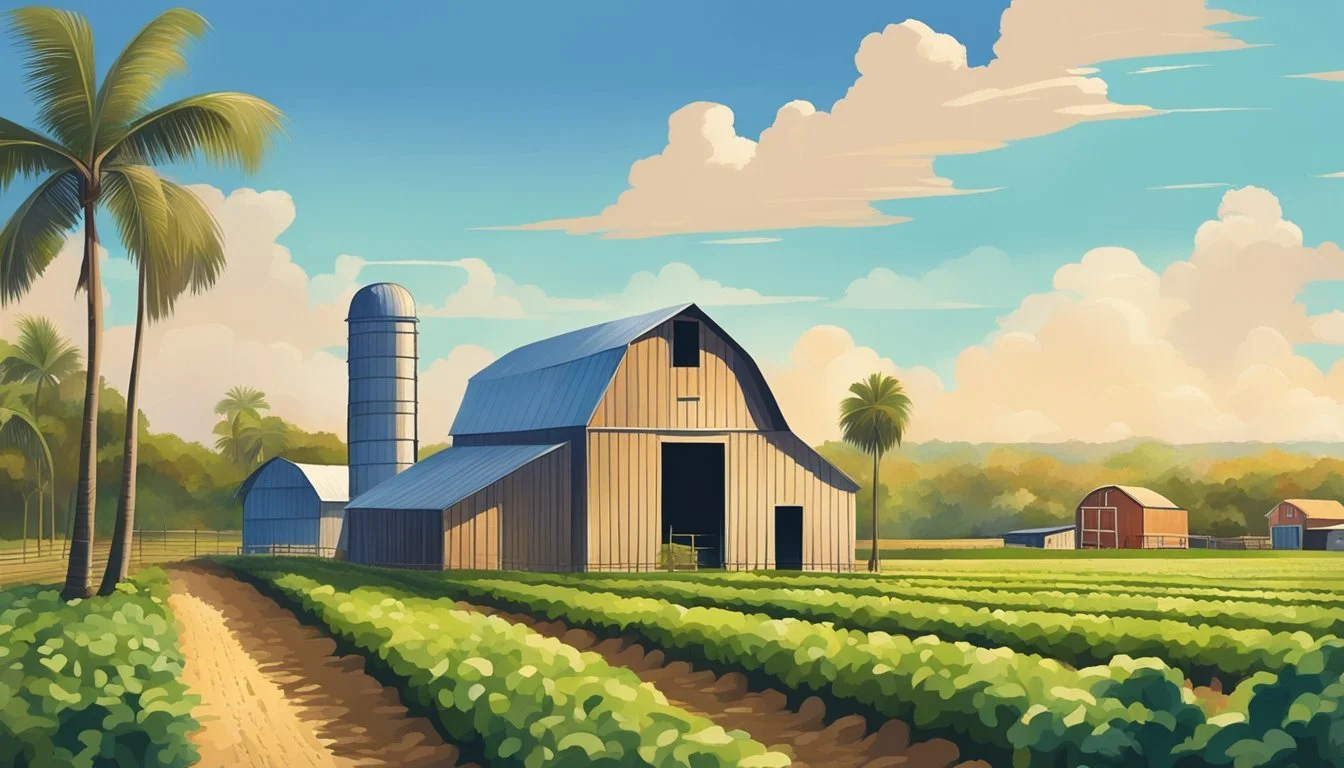Small Farms for Sale in Florida
Expert Guide to Finding Your Idyllic Retreat
This Article is Part of State-by-State Guide to Buying Your First Small Farm
Florida's diverse agriculture sector offers a variety of small farms for sale, featuring a range of sizes, crop types, and locations. These properties cater to different farming practices and lifestyles, from equestrian estates in Marion County to groves of fruit trees in the subtropical climate zones. Buyers interested in small-scale farming or rural living in Florida will find opportunities across the state, in areas known for their agricultural heritage and community support for farming activities.
With increasing interest in local food production and sustainable living, small farms in Florida present a viable option for those looking to enter the agricultural market or expand their existing operations. These farms typically offer the advantage of being more manageable in size, making them suitable for family-run businesses and those new to farming. The state's warm climate, ample rainfall, and extended growing seasons contribute to the appeal of farming in Florida, allowing for diverse crop cultivation throughout much of the year.
As the interest in small farms continues, current listings reveal a variety of properties available for purchase. For instance, properties range from sizable equestrian farms featuring ample acreage and equipped facilities to cozy homesteads suitable for organic gardening or boutique farming. While the market fluctuates, the allure of owning a piece of Florida's farming landscape remains a constant draw for many looking to realize their dream of owning a farm.
Overview of Small Farms in Florida
Florida presents a rich tapestry of agricultural opportunities, ranging from extensive citrus groves to hobby farms nestled in the rural countryside. Prospective buyers find a diverse selection of small farms for sale throughout the state, catering to various agrarian ventures.
Marion County and Levy County are notable regions offering sizable acreages, often exceeding 10 acres. These plots typically come with residential amenities, thus serving the dual purpose of livelihood and living. Miami-Dade County is another area where small farms, though less extensive in acreage, harness the advantages of proximity to urban markets.
Small farms in Florida, including rural mini farms and country farmettes, are often sought after by those looking to engage in agriculture on a smaller scale. They offer manageable spaces for organic farming, equestrian facilities, or specialty crop cultivation.
County Typical Size Property Features Marion 10.3 - 32 acres Residential buildings Levy 18.7 - 21.5 acres Residential buildings Miami-Dade 4.87 acres Proximity to urban areas
The investment in a small farm in Florida can be driven by various aspirations, from establishing a family homestead to embarking on sustainable agriculture practices. With the unique climate and geography of the region, these small farms offer fertile soil and often favorable conditions for a wide range of crops and farming activities.
Benefits of Owning a Small Farm
Owning a small farm in Florida offers several tangible benefits, from establishing a self-sufficient lifestyle to potential financial gains.
Sustainable Living
Owning a small farm allows individuals to embrace sustainable living practices. Farmers can produce their own food, reducing reliance on commercial supply chains, and employ renewable energy sources such as solar power. This lifestyle not only contributes to environmental conservation but also promotes a healthier, organic way of living.
Personal Agriculture
Engaging in personal agriculture offers the benefit of cultivating crops and raising livestock suited to one's personal preferences and dietary needs. With Florida's favorable climate, a variety of produce can be grown year-round, providing fresh and nutritious food directly from farm to table.
Investment Potential
Small farms in Florida can be a wise investment avenue. The real estate value of agricultural land has historically appreciated, offering long-term financial benefits. Additionally, owners can generate income through direct sales of produce, agritourism, or leasing out land.
The key is to conduct thorough research and understand the market to maximize the investment potential of farm ownership.
Key Considerations Before Purchasing
When considering the purchase of a small farm in Florida, several key factors must be weighed to ensure a successful investment. Prospective buyers should approach the decision with clarity and a solid understanding of what is involved.
Financing: One must secure financing prior to searching for a farm. They can choose seller financing or traditional lending institutions.
Location and Access: Researching the farm's location and accessibility is crucial. Buyers should assess proximity to markets, services, and transportation infrastructure.
Size and Maintenance: The property size should match the buyer's capacity for upkeep. A larger acreage may offer more potential but requires significant maintenance.
| Property Size | Maintenance Required |
|---------------|----------------------|
| Small acreage | Lower |
| Large acreage | Higher |Land Attributes: It is essential to ensure that any existing land improvements align with the intended use, whether it be for a residence or commercial enterprise.
Price: To make a sound investment, purchasers should ensure the purchase price reflects the quality and potential of the property. Diligent market research can aid in securing a fair deal.
In summary, buyers should carefully consider the farm's acreage, the financial implications, practical aspects of the land, and its suitability for their plans—be it personal or commercial. They must evaluate each factor with confidence and attention to detail to make a well-informed purchase.
Finding the Right Location
When selecting a location for purchasing rural mini farms in Florida, potential buyers must consider several key factors to ensure the property meets their specific needs. Florida presents a broad range of geographical regions with distinct characteristics suitable for different types of farming.
Marion County, for instance, is a notable area that offers larger land parcels. Buyers can find properties around 10 to 32 acres which can cater to a variety of small-scale agricultural practices. Levy County is another region where small farms are commonly available, showcasing properties with acreage typically from 18 to 21 acres.
Here's a breakdown of regions in Florida known for small farm sales:
Central West Region: Offers a balanced rural setting with access to larger markets.
North Central Region: Known for rich soils and supportive farming communities.
Southwest Region: Features a mixture of farming and suburban landscapes.
Buyers should also research specific areas, like the North Florida region, which may have a variety of rural mini farms for sale. Listings in this region suggest availability of properties around 18 to 20 acres, indicative of the size of farms commonly on the market.
One should analyze the local climate, soil quality, water availability, and community resources. Proximity to markets, transportation, and local farming support services are also vital. Here is a compact view of considerations:
Consideration Description Climate Vital for crop/livestock compatibility Soil Quality Affects the types of crops that can be grown Water Availability Essential for irrigation and livestock Community Resources Local support services and markets
By evaluating these factors with a clear and unbiased perspective, those interested in Florida's rural mini farms and land for sale can make well-informed decisions that align with their agricultural goals.
Understanding the Market
When navigating the market for small farms in Florida, prospective buyers should be aware of the overall real estate trends and a detailed listing price analysis to make informed decisions.
Real Estate Trends
The Florida small farm market is experiencing variation in availability and price, influenced by factors such as location, acreage, and amenities. Marion County has been highlighted as a notable area with active listings, presenting properties ranging from 10.3 to 32 acres. It showcases the diversity of the market, with farms demonstrating significant differences in size and infrastructure, which in turn affects the real estate trends.
Listing Price Analysis
Current listings reveal a broad range in pricing, indicating a market that can accommodate various budgets and investment levels. For a clearer understanding, let's examine the provided data in more detail:
Minimum Listing Price: The listings for small farms start from the lower end of the price spectrum, but such specific data wasn't provided in the search results.
Maximum Listing Price: Properties have been listed for as high as $3,499,000 in Marion County for a 32-acre property with a 5,011 square foot residential area.
County Acreage Building Size (sq ft) Listing Price ($) Marion County 10.3 - 32 2,334 - 5,011 1,550,000 - 3,499,000
Evidently, price per acre is not uniform and varies significantly based on factors like location and the presence of developed structures, which is essential for buyers to consider as they assess listings.
Budgeting for Your Farm
When seeking to purchase a small farm in Florida, buyers should carefully consider and calculate the total costs involved and explore financing options, including those offered directly by owners.
Calculating Total Costs
When calculating the total cost of a farm, buyers must account for the purchase price and the price per acre, as these figures are critical to developing a comprehensive budget. The per-acre cost can vary significantly, with some regions in Florida listing farms as low as $50,000, while others may reach higher price points. Below is a simplified breakdown:
$ / ac min: The minimum price per acre buyers should expect based on listings.
$ / ac max: The maximum price per acre that could be encountered.
When planning the budget, prospective farm owners should include additional expenses beyond the purchase price. These can range from closing costs and property taxes to farm equipment and operational costs.
Owner Financing Options
Owner financing can be a viable option for buyers looking for alternative financing methods. This often involves a down payment followed by installment payments directly to the seller rather than through traditional mortgage lenders. Here's a basic structure of how owner financing might work for farm purchases:
Down Payment: A percentage of the total purchase price paid upfront.
Installment Payments: Regular payments including interest agreed upon by both parties.
Farm buyers should inquire about owner finance options as they can sometimes offer more flexible terms compared to conventional bank loans. It is critical that buyers fully understand the terms and conditions of any owner financing agreement before proceeding.
Exploring Property Listings
When searching for small farms in Florida, potential buyers will find a variety of listings, each offering unique features perfect for different agricultural needs. The market showcases properties with varying acreage, ensuring choices for both modest family operations and larger-scale farming endeavors.
Marion County features prominently with multiple farms for sale. Recent listings include a 32-acre farm in Morriston, boasting a 5,011 sq ft residence with 4 bedrooms. The property has been on the market for over a month. Meanwhile, a 10.3-acre property also in Marion County offers a 2,334 sq ft, 4-bedroom home, and has been listed for around 50 days.
Moving south, the diversity in listings continues. A 4.87-acre farm situated in Miami-Dade County, near Miami, presents a more urban option, showing that agricultural properties can vary widely in their proximity to city centers.
In North Florida, buyers can explore an expansive 19.6-acre farm in Levy County with a large, 4,789 sq ft, 4-bedroom residence, reflecting the listings mentioned earlier in Marion County.
County Acreage Listing Age Property Size Bedrooms Marion County 32 acres 37 days 5,011 sq ft (4 bd) 4 Marion County 10.3 acres 50 days 2,334 sq ft (4 bd) 4 Miami-Dade 4.87 acres 40 days - - Levy County 19.6 acres 60+ days 4,789 sq ft (4 bd) 4
It's clear that Florida's real estate market for small farms provides a wealth of opportunities, whether buyers are seeking a lifestyle change or looking to expand their agricultural ventures. They have the potential to find land that meets their specifications for size, location, and residential accommodations.
Farm Management Basics
When managing a small farm in Florida, one must pay close attention to livestock care and crop cultivation. These fundamental aspects require specific practices to ensure sustainability and productivity of the farm.
Livestock Care
Livestock care is critical for the wellbeing of animals such as goats, sheep, and poultry, which are common on small Florida farms. For goats, ideal acreage should allow for at least 10 to 15 goats per acre to prevent overgrazing and maintain a healthy environment. The table below outlines basic livestock needs:
Livestock Space per Animal Shelter Needs Water Accessibility Goats 0.1 to 0.15 acres per goat Three-sided shelter to protect from elements Clean water source required Sheep 0.1 to 0.15 acres per sheep Adequate shelter for harsh weather Fresh water, checked daily Poultry 2-3 square feet per bird indoors; 8-10 outside Coop for protection from predators Consistent water supply
These animals also require regular health check-ups and vaccinations, which are critical for preventing diseases that can spread rapidly through a herd or flock.
Crop Cultivation
Crop cultivation should be approached with an understanding of Florida's climate and soil types. For small farms, diversification is key to managing risk and increasing resilience. Farmers should consider:
Soil testing regularly to inform nutrient management.
Drip irrigation to conserve water and ensure crops receive adequate moisture.
Crop rotation to prevent soil depletion and reduce the risk of pests and diseases.
For instance, in Florida's sandy soils, farmers should use organic matter to improve soil structure, which benefits root crops or pastures for livestock. Each crop requires a specific spacing, depth, and environment to thrive, and accurate records should be kept to plan for future plantings and crop rotation schedules.
Closing the Deal
When purchasing small farms in Florida, understanding the steps to close the deal is paramount. Accurate negotiation and finalization are critical components to acquiring the desired property.
Negotiating the Purchase Price
The buyer should approach negotiations with a clear assessment of the property size and its impact on the purchase price. Gathering data on recent sales of similar properties can provide leverage for negotiating a fair price. It's advisable to consider factors such as:
Acreage: Smaller farms, like a 10.3-acre farm in Marion County, might be priced differently than larger estates.
Property features: The presence of a fully-equipped house and any additional amenities can drive the price up or down.
A strategic negotiation leads to an agreeable purchase price for both buyer and seller.
Finalizing the Sale
Once the purchase price is agreed upon, finalizing the sale involves a series of steps:
Conduct a title search to ensure there are no disputes or liens on the property.
Secure financing, if necessary, with a bank or financial institution.
Review and sign the sales contract, which should detail the property size and agreed purchase price.
Closing the deal concludes with a property transfer, whereupon the buyer becomes the new owner.
Post-Purchase Considerations
After purchasing a small farm in Florida, a buyer should be aware of crucial steps toward enhancing their property and understanding the accompanying responsibilities. These include farm improvement and navigating the legal and tax implications of farm ownership.
Farm Improvement
Once the farm is purchased, one must assess the land's current state and outline a plan for any necessary enhancements. Improvement projects may include:
Building or repairing structures: Consider the condition of barns, fences, and homes, and whether they need renovation or replacement.
Land development: Assess soil health and plan for crop rotation, pest management, and irrigation systems to increase productivity.
Equipment: Evaluate and invest in essential machinery such as tractors, plows, or harvesters.
Prioritization is key, focusing on projects that:
Ensure the farm’s operational efficiency
Have the most significant impact on productivity and sustainability
Legal and Tax Implications
The legal and tax side of farm ownership requires diligent attention to detail. Owners should:
Zoning Laws: Familiarize themselves with local agricultural zoning regulations to ensure compliance in all farming activities.
Tax Regulations: Understand the specific tax benefits and obligations for farmers, often guided by schedules F and J:
Schedule F: Reports farming income and expenses to the IRS.
Schedule J: Helps average farm income over three years, potentially lowering the tax burden during profitable years.
Farmers may take advantage of deductions for:
Farm equipment depreciation
Feed, fertilizer, and other farm supplies
Costs associated with improving the land, such as soil conservation expenses






